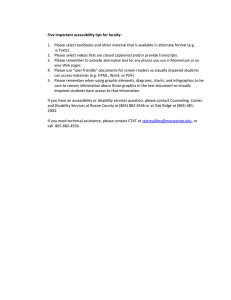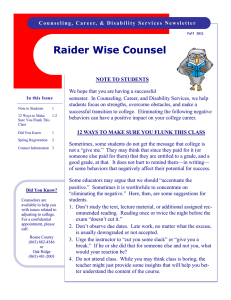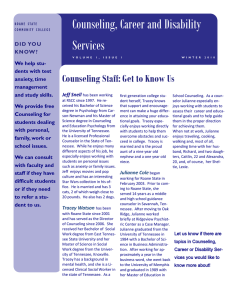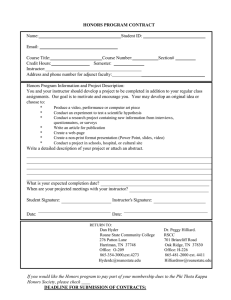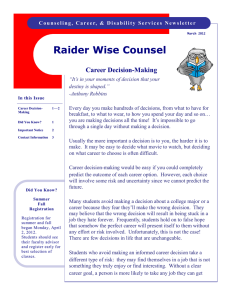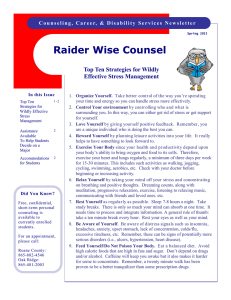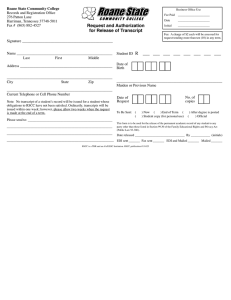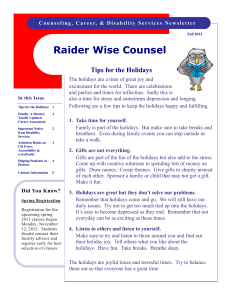Document 12066641
advertisement
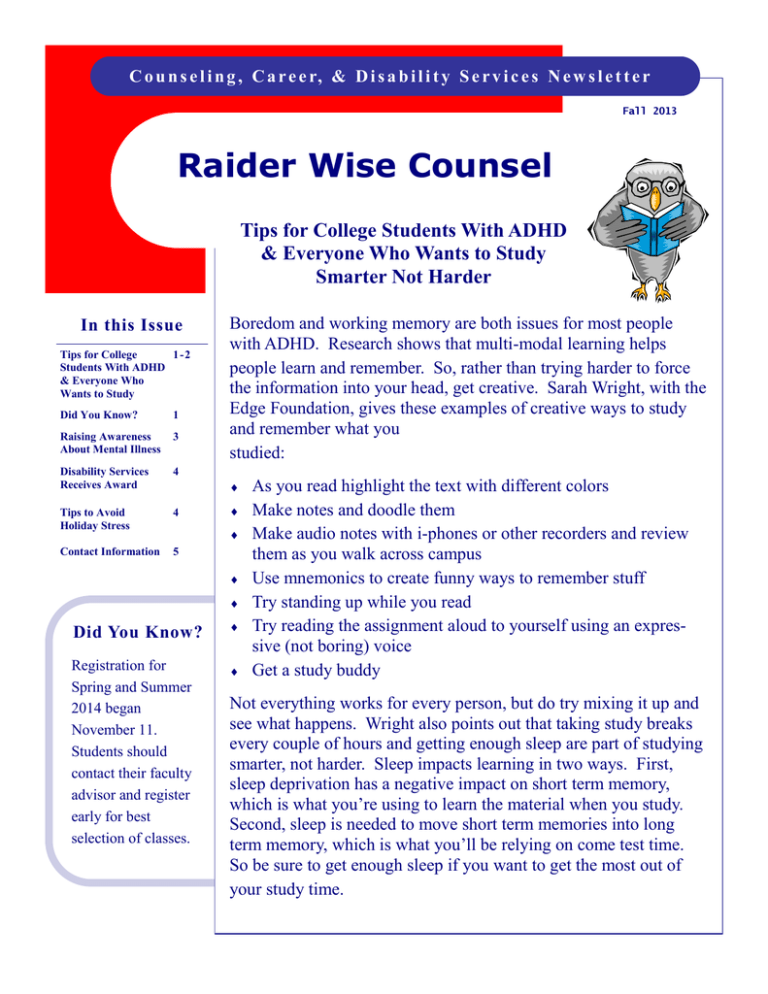
C o u n s e l i n g , C a r e e r, & D i s a b i l i t y S e r v i c e s N e w s l e t t e r Fall 2013 Raider Wise Counsel Tips for College Students With ADHD & Everyone Who Wants to Study Smarter Not Harder In this Issue Tips for College 1 -2 Students With ADHD & Everyone Who Wants to Study Did You Know? 1 Raising Awareness About Mental Illness 3 Disability Services Receives Award 4 Tips to Avoid Holiday Stress 4 Contact Information 5 Boredom and working memory are both issues for most people with ADHD. Research shows that multi-modal learning helps people learn and remember. So, rather than trying harder to force the information into your head, get creative. Sarah Wright, with the Edge Foundation, gives these examples of creative ways to study and remember what you studied: Did You Know? Registration for Spring and Summer 2014 began November 11. Students should contact their faculty advisor and register early for best selection of classes. As you read highlight the text with different colors Make notes and doodle them Make audio notes with i-phones or other recorders and review them as you walk across campus Use mnemonics to create funny ways to remember stuff Try standing up while you read Try reading the assignment aloud to yourself using an expressive (not boring) voice Get a study buddy Not everything works for every person, but do try mixing it up and see what happens. Wright also points out that taking study breaks every couple of hours and getting enough sleep are part of studying smarter, not harder. Sleep impacts learning in two ways. First, sleep deprivation has a negative impact on short term memory, which is what you’re using to learn the material when you study. Second, sleep is needed to move short term memories into long term memory, which is what you’ll be relying on come test time. So be sure to get enough sleep if you want to get the most out of your study time. Page 2 Tips for College Students With ADHD & Everyone Who Wants To Study Smarter Not Harder (cont.) Schedule Your Study Time Counselors are available to help you decide on a major deal with stressors set up accommodations for a disability To schedule an appointment, please call Roane County (865) 882-4546 Oak Ridge (865) 481-2003 Counselors are available at other locations by appointment. Many students with ADHD are quite smart. They can often pull a passing grade in high school (or even a good one) just cramming the night before the tests. Odds are that strategy won’t work in college. Wright says a good rule of thumb for college is 2-2.5 hours of study time per week for every unit of course credit. “Basically, you should think of college as a job and plan to spend at least 40 hours a week on classes and class work,” she says. “What works for many students is to actually treat college as a job: for 9 hours a day, five days a week you’re working on school, which means during the day when you’re not in classes you’re somewhere studying or catching a quick bite to eat. If you like to play sports [or have other commitments such as a job], you’ll have to make up those study hours. As long as you block out the requisite number of hours somewhere in your daily schedule and remember that school is your job, you should be fine.” Plan Your Time to Keep on Track: Assess and Prioritize It may sound strange, but it is very important to actively plan time to plan. If you don’t develop this habit, you’ll find yourself always being reactive rather than proactive. Wright suggests doing a high level plan for the week Monday morning, and for the weekend on Friday. Then doing a daily review of that plan over breakfastpossibly adding pertinent details-to make sure you know what’s coming your way that day. When you can assess what you need to do versus all that you could do, then you can prioritize what needs to be done first and take care of it. Sticking to Your Plan Remaining committed to your plan is always the hard part. Counselors are available to assist with your individual challenges. Adapted from ADD/ADHD article at About.com by Keath Low & Sarah D. Wright, Edge Foundation Page 3 Raising Awareness About Mental Illness Accommodation Reminder Students needing accommodations should schedule an appointment with his/her counselor each semester before classes begin. Remember that accommodations are not retroactive, and they do not roll from semester to semester. With the conclusion in October of Mental Health Awareness Month, it seems appropriate to share some information on the subject. Mental illnesses are medical conditions that can disrupt a person’s thinking, feelings, moods, relationships, and the ability to adjust to change and difficult times. Mental illnesses result in a variety of symptoms that can affect one’s ability to relate to others, express empathy and compassion, cope with the stresses of daily life, and regulate behavior. Our psychological wellness affects many layers of our life and can result from a variety of medical or situational issues. People of any age, race, gender, socioeconomic class, religion, or income level can be affected by mental illness. Mental health problems are common and are usually treatable. They are not a sign of personal weakness or a lack of character. According to the National Alliance for the Mentally Ill, one in four adults (about 60 million Americans) experience a mental health disorder in a given year. One person in 17 lives with a serious mental illness. About one in 10 children live with a serious mental or emotional disorder. Yet fewer than one-third of adults and onehalf of children with diagnosed mental health issues receive treatment each year. It is likely that everyone of us has either been touched by mental illness or knows someone who has. When the symptoms of mental illness strike, it can be hard to recognize and can be easily explained away. However, if the symptoms persist and patterns of behavior and mood difficulties are clear, those closest to you will notice. Often it is a concerned family member or close friend who sees the changes first. Counselors can help determine if you are experiencing a mental illness and what steps you need to take. To schedule an appointment for confidential personal counseling, please call Roane County (865) 882-4546 or Oak Ridge (865) 481-2003. Personal counseling is available at other locations by appointment. Adapted from an article in Community College Times by Stacey Brown Page 4 RSCC Disability Services Receives Award At State Conference Roane State Community College (RSCC) Counseling, Career, and Disability Services Department received an award at the annual 2013 TN AHEAD (Tennessee Association of Higher Education and Disabilities) state conference in Cookeville, TN. The award recognizes RSCC Counseling, Career, and Disability Services Department for their commitment to TN AHEAD on the RSCC campus evident through outstanding institution-wide membership in TN AHEAD. RSCC currently has 17 members in TN AHEAD, which is more than any other college in the state. Tracey, Jeff, Julianne, Carol, and Tina wish everyone a safe and happy holiday season. RSCC Director of Counseling, Career, and Disability Services Tracey Watson, explained, “TN AHEAD is comprised of 47 postsecondary disability services providers in the state, and we are honored to receive such a distinguished award among our peers. We are fortunate that faculty and staff at Roane State share our commitment to both students and equal access.” Tips to Avoid Holiday Stress Do something for yourself. Do something nice for someone without expecting anything in return. Even for a moment here and there, view the holidays from the viewpoint of a child. Understand that it is okay to say “no”. Judge less, and accept more. Be realistic. Don’t expect everything to be perfect. Make a list, set a budget, and stick to it. Page 5 RAIDER WISE COUNSEL Roane State Community College Counseling, Career, and Disability Services Contact Information Counseling, Career, & Disability Services Staff: Roane County Tracey Watson, Director watsontl@roanestate.edu 865-882-4546 Tracey Watson Director Carol Jarabek, Support Staff jarabeklc@roanestate.edu 865-882-4546 Jeff Snell Counselor Oak Ridge Jeff Snell, Counselor snellja@roanestate.edu 865-481-2003 Julianne Davis-Cole Counselor Julianne Davis-Cole, Counselor davisjy@roanestate.edu 865-481-2003 Tina Messamore Support Staff Tina Messamore, Support Staff messamore@roanestate.edu 865-481-2003 Carol Jarabek Support Staff www.roanestate.edu/counseling www.roanestate.edu/disabilityservices www.roanestate.edu/careerservices From bottom left: Carol Jarabek, Tracey Watson, Julianne Davis-Cole From top left: Tina Messamore & Jeff Snell Roane State Community College is a TBR and AA/EEO employer and does not discriminate on the basis of race, color, national origin, sex, disability or age in its programs and activities. The following person has been designated to handle inquiries regarding the non-discrimination policies: Director of Human Resources/Affirmative Action, 276 Patton Lane, Harriman, TN 37748, (865) 882-4679, humanresources@roanestate.edu. RSCC Publication#14-053.
